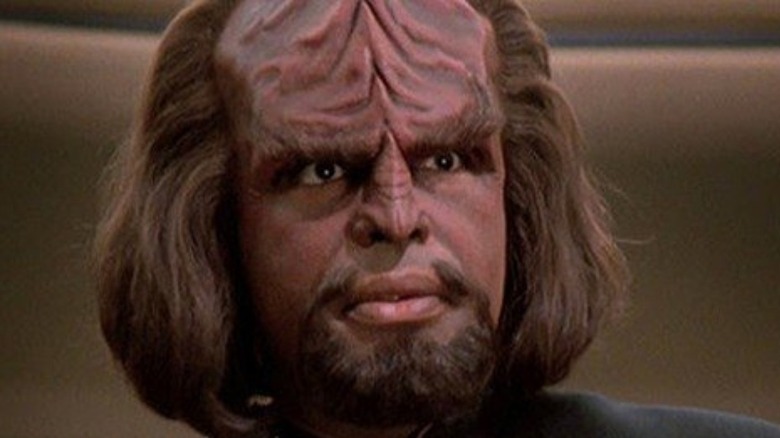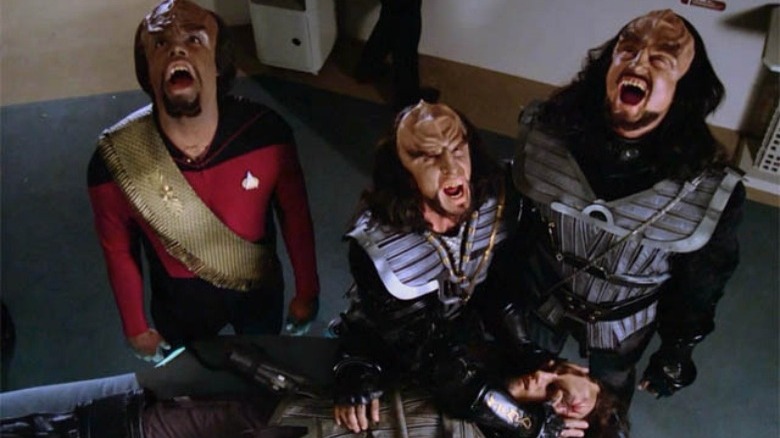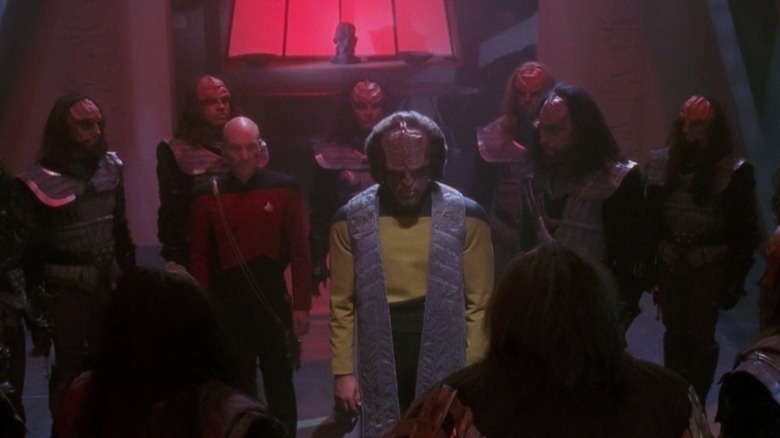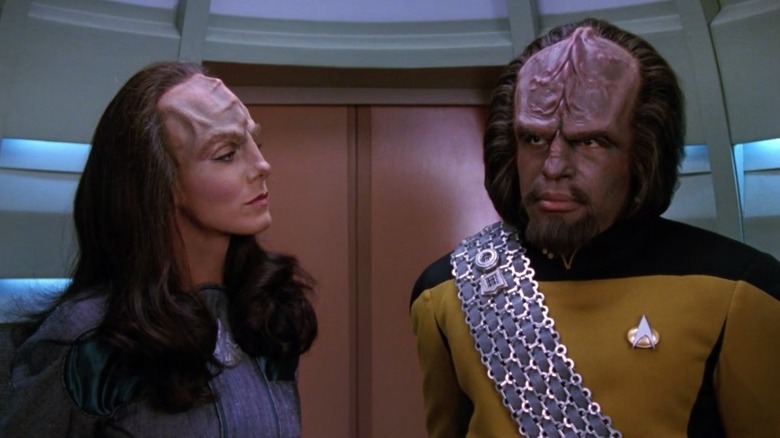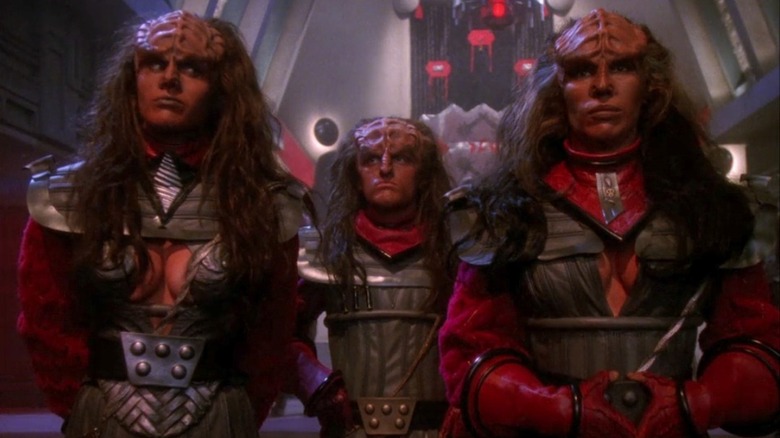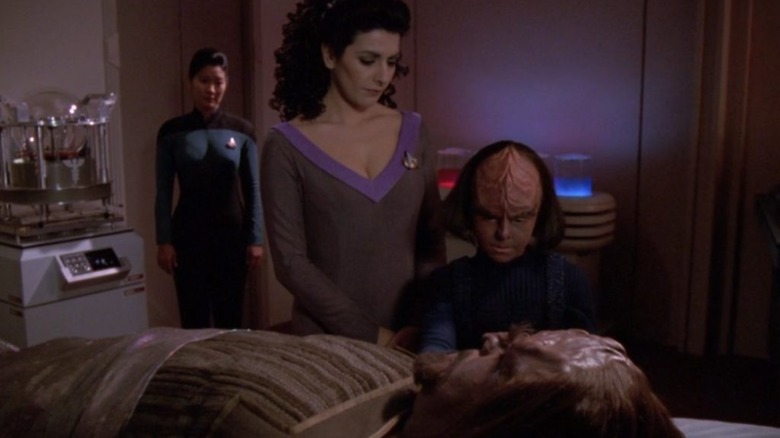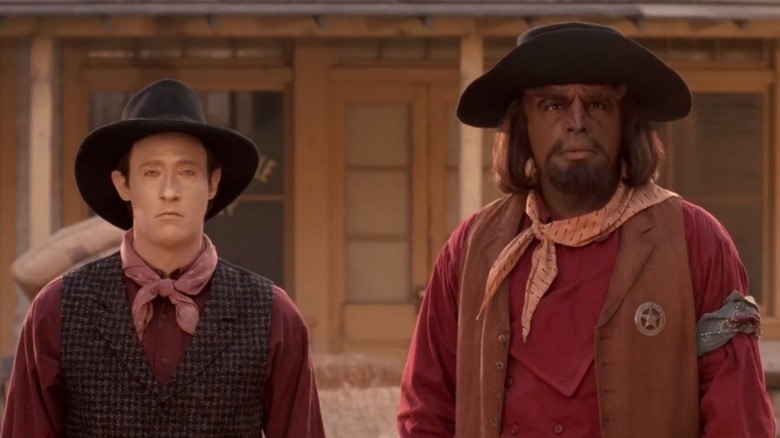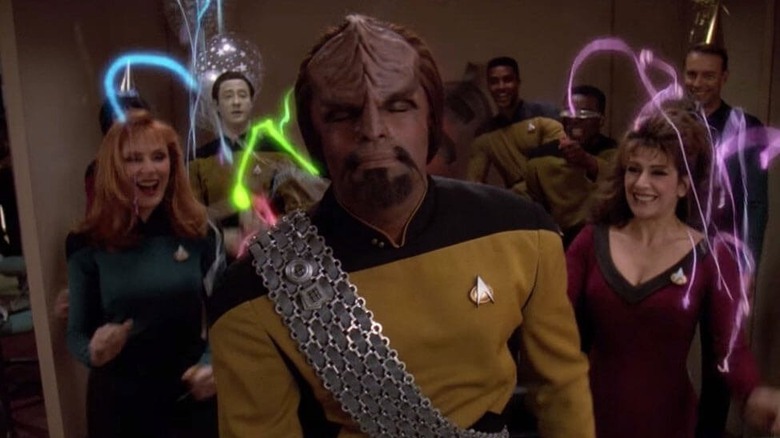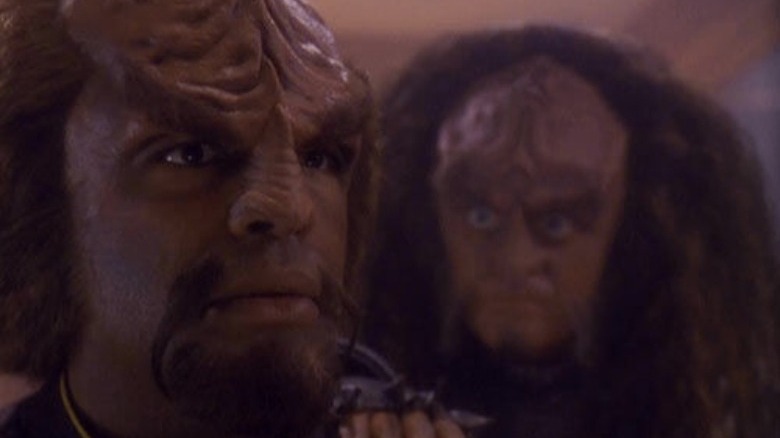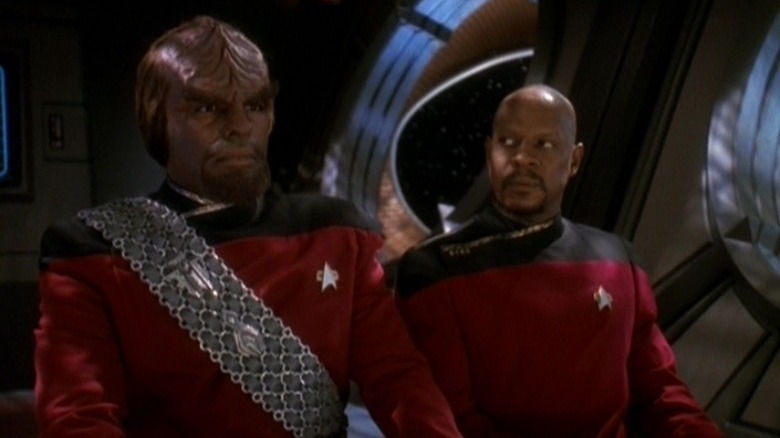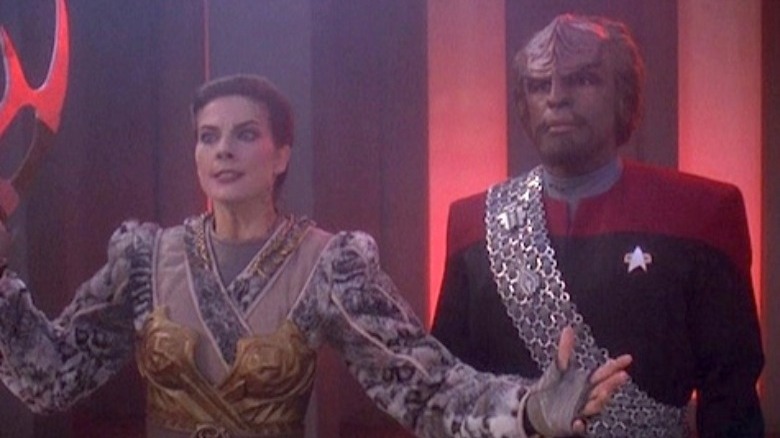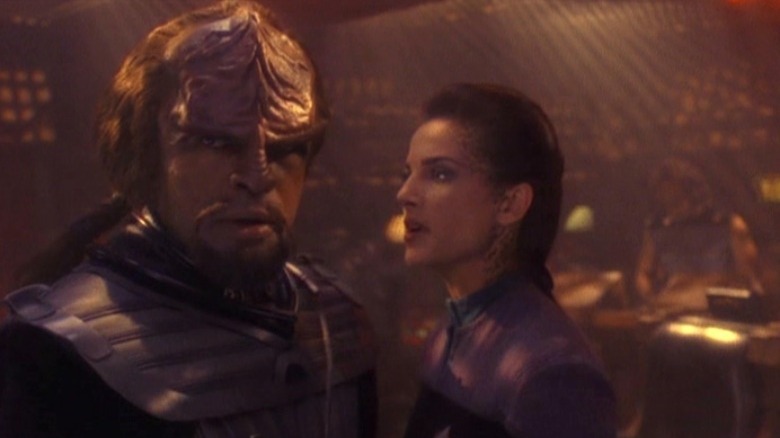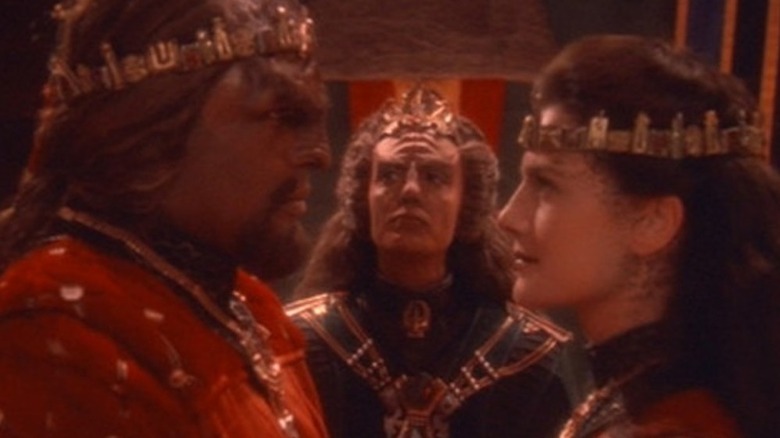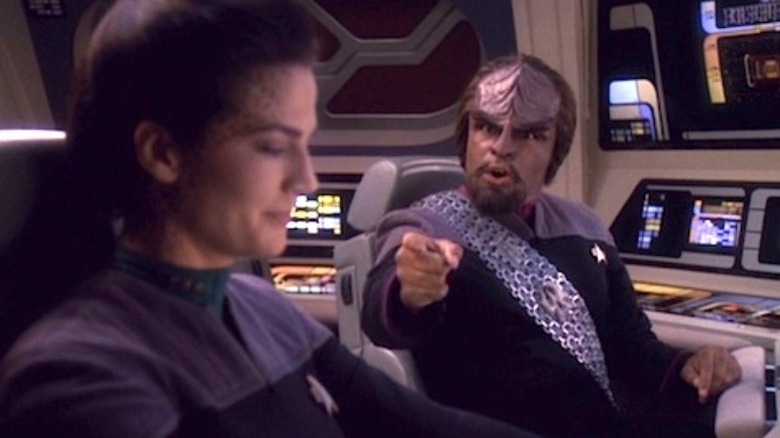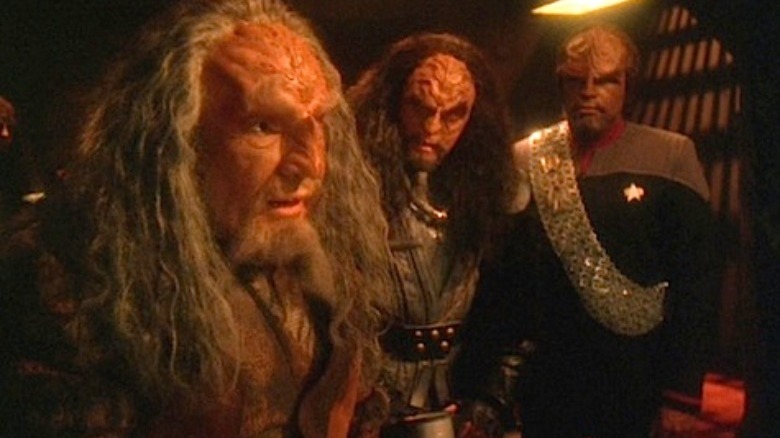The Best Worf Episodes Of Star Trek
The Klingons have undergone heavy changes over the course of the "Star Trek" story. They're more or less generic bad guys when they first appear in "Star Trek: The Original Series," whose only visible physical difference from humanity is their uniformly dark skin and hair. The films add ridges to their foreheads and give their attire a radical redesign, along with a new language. "Star Trek: The Next Generation" takes things further still: In this series, a Klingon serves aboard the new Enterprise. He quickly became a fan favorite.
Worf, played to perfection by Michael Dorn, is often defined as a man split between two cultures. While he is a Klingon and feels a strong pull to Klingon culture and people, he was raised by humans. Almost all of the Worf-centric episodes of "The Next Generation" and "Star Trek: Deep Space Nine" examine this inner struggle. What follows are our picks for the best Worf episodes of either of the two "Star Trek" series Worf calls home, presented in chronological order. Spoilers ahead for various "Star Trek" shows and movies!
TNG: Heart of Glory
Airing in the latter half of Season 1 of "TNG," fans got the series' first truly Worf-centric episode with "Heart of Glory." After the Enterprise rescues a trio of Klingons from a damaged freighter, Worf discovers the survivors are lying about being attacked by Ferengi. The freighter they were rescued from was stolen, and it was damaged while battling and ultimately destroying a Klingon cruiser. The three Klingons — soon only two, as one succumbs to his wounds — believe the Klingon Empire has become weak because of its peace with the Federation, and wish to return to their people's ancient, warlike ways.
"Heart of Glory" is a critical and well-executed first step, not only in the story of Worf, but in the "TNG" era's redefinition of the Klingons. It's the first time we get to see Worf act as the warrior he's always yearning to be, and the first portrayal of the Klingons as a proud people with their own inviolate sense of honor.
TNG: Sins of the Father
In Season 3's "Sins of the Father," Tony Todd makes his first of many guest appearances in the "Trek" franchise as Worf's brother Kurn. Kurn informs Worf that their late father Mogh faces accusations of treachery in the Klingon High Council. With Captain Picard serving as his second, Worf confronts the council, eventually uncovering the truth: It is the father of Duras (Patrick Massett), Mogh's primary accuser, who betrayed the Klingons to the Romulans. Mogh has been framed to keep the Empire from sinking into civil war. Wanting to maintain the Empire's peace while saving the life of his newfound brother, Worf accepts discommendation — basically, no longer being considered a Klingon to his people.
For any fan of Worf, "Sins of the Father" can be tough to watch, even if you know what the future has in store for Worf and the Empire. Still, the episode is crucial in Worf's continuing story. It introduces us to Kurn, to the duplicitous Duras, and sets the stage for "Redemption," one of the best two-parters in all of "TNG."
TNG: Reunion
First appearing in Season 2's "The Emissary," Suzie Plakson returns as the half-Klingon K'Ehleyr two seasons later in "Reunion." She's not alone: Following her brief tryst with Worf earlier in the series, K'Ehleyr has given birth to their son, Alexander.
Meanwhile, the Klingon High Councilor K'mpec (Charles Cooper), knowing he has been poisoned and will soon die, appoints Captain Picard as the Arbiter of Succession. This is in the hopes that he will be able to ferret out which of the two Klingons vying to succeed him — Gowron (Robert O'Reilly) or Duras — has murdered him. In the investigation that follows, K'Ehleyr discovers the truth about Duras framing Worf's family for treachery in Season 3's "Sins of the Father." Duras silences her with a fatal stab.
In one of the most shocking moments in all of "TNG," Worf claims the right of vengeance and kills Duras on his own ship. It's one of the few moments in all of "Trek" in which Worf weighs the choice of acting as a Starfleet officer against acting as a Klingon warrior, and chooses the latter.
TNG: Redemption
In "Redemption," a two-parter bridging the Season 4 finale and the Season 5 premiere, Worf fans finally get the payoff they've been waiting for since Season 3's "Sins of the Father." As the Arbiter of Succession, Captain Picard returns to Qo'noS to finalize the installment of Gowron as Klingon Chancellor. But when the sisters Lursa (Barbara March) and B'Etor (Gwynyth Walsh) challenge Gowron's claim with young Toral (JD Cullum), son of the late Duras, the seeds of civil war are planted. Worf takes the opportunity to reunite with his brother Kurn and convince Gowron to restore his family's name. An epic war story unfolds, eventually involving not only the Klingons and the Federation, but their shared foe, the Romulans.
Of all the Worf-focused "Trek" episodes, "Redemption" is one of the heaviest in terms of how it impacts the overall narrative. Not only is Worf's discommendation finally reversed, we're introduced to recurring villains Lursa and B'Etor, who go on to bother the crew of "DS9," as well as appear in the 1994 film "Star Trek: Generations." Denise Crosby also makes her first appearance as Sela, the half-Romulan daughter of the late Tasha Yar.
TNG: Ethics
Worf's always known that he risks death every moment he serves as a Starfleet officer, but in Season 5's "Ethics," he faces something he finds much more terrifying: paralysis. When Worf and Geordi investigate strange readings in a cargo bay, a heavy container falls on Worf and crushes his spine, paralyzing him. Believing, as a Klingon, that life is no longer worth living, Worf asks Riker to help him commit Hegh'bat, Klingon ritual suicide. At the same time, Dr. Crusher and neurology specialist Dr. Russell (Caroline Kava) clash over the ethics of the radical procedure Russell wants to perform on Worf.
The "Star Trek" franchise is known for tackling difficult issues, and this episode is no exception. Out of all the episodes that focus on Worf, "Ethics" is doubtlessly the most controversial. Worf's story deals with euthanasia, while the conflict between Crusher and Russell tackles medical and scientific ethics. At the same time, considering Worf seems more willing to die than live with a disability, the issue of ableism is present as well. If there's any great weakness to the episode, it's that the futuristic new spine Worf receives offers a sci-fi easy button to a reflection of real life dilemmas.
If you or anyone you know is having suicidal thoughts, please call the National Suicide Prevention Lifeline at 1-800-273-TALK (8255).
TNG: A Fistful of Datas
12 years before the Western series "Deadwood" premiered on HBO, Worf, Alexander, and Counselor Troi find themselves in the town of Deadwood in "A Fistful of Datas" ... or at least a holographic facsimile of it. Initially, it's just meant as a setting for Alexander's playtime. But a malfunction makes things a lot more dangerous as a number of characters on the holodeck become Western copies of Commander Data, including the ruthless villain Frank Hollander.
While there are a good number of fans who groan at the mention of malfunctioning holodeck episodes, it's tough not to love "A Fistful of Datas." One of the half-dozen "TNG" episodes directed by Patrick Stewart, the story is lighthearted, fun, and packed with memorable moments. It's impossible not to laugh at Worf in his ridiculous hat, or Brent Spiner's perfect caricatures of Western archetypes. Considering the strange and often heartbreaking relationship between Worf and his son, it's also one of the most touching Worf-Alexander episodes in the franchise.
TNG: Parallels
In "Parallels," an episode from the final season of "TNG," Worf returns to the Enterprise from a bat'leth tournament and becomes unsettled by increasingly strange occurrences. Decorations in his quarters shift around, the guest list of the surprise birthday party he's dreading keeps changing, and, most shockingly of all, he learns Counselor Troi thinks they're a romantic couple.
We eventually learn that on his way back from the tournament, Worf unintentionally piloted his shuttlecraft through a quantum fissure, which is causing him to shift through different realities. We see this reflected from scene to scene, and sometimes even from shot to shot. Decorations all over the ship change, different characters hold different positions, and in one case, Worf discovers Wesley Crusher still serving aboard the Enterprise, even though he hasn't been seen on the show since two seasons previous.
"Parallels" give us a lot of fun alternate reality shots of the Enterprise crew, including a grizzly-bearded Will Riker from a universe where the Borg are the dominant lifeforms. But beyond that, of all the best Worf-centric episodes, "Parallels" is one of the few that doesn't revolve around Worf's inner struggles as a Klingon.
DS9: The Way of the Warrior
In Season 4 of "Star Trek: Deep Space Nine," Worf joins the series as its newest regular cast member. Still mourning the loss of the Enterprise-D in "Star Trek: Generations," Worf is summoned to DS9 to find out why a large Klingon fleet has arrived at the station. When he discovers the fleet's commanding officer General Martok (J.G. Hertzler) plans to invade the neighboring Cardassian Empire, Worf once again finds himself choosing between his loyalty to his people and his duty as a Starfleet officer.
"The Way of the Warrior" is not only a great Worf episode, it's a game-changer for "DS9" and "Trek" as a whole — perhaps the only Worf episode to cause more ripples across the franchise's continuity than "Redemption." It lays the foundation for Cardassia's entry into the Dominion in Season 5 of "DS9," sets up a rivalry between Worf and Gowron that doesn't end until the latter's death in the final season, and temporarily ends the long peace between the Federation and the Klingons. It also introduces us to Martok (though this version ultimately proves to be a Changeling in disguise), and gives us one of the franchise's most impressive portrayals of a large-scale space battle. Not to mention, it's a start-to-finish love letter to fans of the Klingons.
DS9: Rules of Engagement
Things get even more tense between the Federation and the Klingon Empire in "Rules of Engagement," which sees Worf accused of purposely destroying a Klingon transport filled with defenseless civilians. Ron Canada plays the cunning Klingon advocate Ch'Pok who arrives on DS9 to argue for Worf's extradition to the Klingon Empire. Captain Sisko represents Worf in the proceedings, which ultimately reveal the entire incident was staged in order to win a propaganda battle against the Federation.
Even though the plot proves to be a frame job, the details uncovered by Ch'Pok bring to light just how close violence waits beneath Worf's surface. Not only does Worf physically attack Ch'Pok, we learn that during one of Worf's favorite holodeck simulations, which recreates a famous Klingon battle, he regularly orders the slaughter of the (albeit holographic) women and children of the conquered city. Worf gets a well-deserved dressing down from Sisko, and takes an important step in his personal evolution.
DS9: Looking for par'Mach in All the Wrong Places
In the "DS9" Season 3 episode "The House of Quark," Klingon Grilka marries Ferengi bartender Quark in a desperate bid to keep control of her family's house. When she returns two seasons later in "Looking for par'Mach in All the Wrong Places," Worf is smitten by her, but she only has eyes for Quark. In an homage to Edmond Rostand's 1897 play "Cyrano de Bergerac," Worf takes it upon himself to teach Quark how to woo Grilka. He writes poetry for the Ferengi, and even uses tech to manipulate Quark's body during a bat'leth match.
Not only is the episode hilarious, "Looking for par'Mach in All the Wrong Places" diverts wonderfully from its source material. By the end of the episode, Worf finds himself with his true love: Jadzia Dax, who has been waiting for the Klingon to make a move since the previous season.
DS9: Soldiers of the Empire
In Season 5's "Soldiers of the Empire," Worf and Jadzia Dax are loaned out to the Klingons to serve under General Martok aboard the Rotarran, where they learn Martok's long imprisonment by the Dominion has made him skittish. Time and again, Martok refuses to act correctly according to Klingon standards, eventually going so far as to order the ship to abandon survivors of a damaged Klingon cruiser. With the crew close to mutiny, Worf has no choice but to challenge Martok to a death duel for leadership. In the ensuing melee, Worf purposely allows Martok to win, risking a killing blow to help jumpstart his friend's warrior instincts.
"Soldiers of the Empire" is a perfect example of what a smart choice it was to add Martok to the series. Not only does it give Worf a chance to interact with more Klingon characters, it gives us the opportunity to see Worf unburdened by the constraints of Starfleet, acting as a Klingon officer would be expected to act on any imperial ship. When Worf challenges Martok, it's not for ambition or bloodlust — it's as much a part of his job as it would be to run practice drills or submit crew assessments.
DS9: You Are Cordially Invited
In Season 6's "Sacrifice of Angels," Starfleet takes DS9 back from the Dominion. In the following episode, "You Are Cordially Invited," Worf and Jadzia take advantage of the break in fighting to get married.
This blessed event is endangered when the ritual demands of Martok's stern wife Sirella (Shannon Cochran) prove too much for Jadzia. In the meantime, Bashir and O'Brien, who believed they'd be enjoying the Klingon version of a bachelor party when Worf invited them to join him on the ritual path of Kal'Hyah, endure four days of fasting, bloodletting, and other forms of torture.
When it comes to Jadzia's resistance to Sirella, "You Are Cordially Invited" offers one of the few examples of Worf butting heads with his Par'Mach'kai and proving to be the one acting more like a grown-up. Moreover, the yearning for vengeance Bashir and O'Brien express for the tortures of Kal'Hyah is hilarious. Finally, not only is this the last time we get to see Worf's grown son Alexander (Marc Worden) in the flesh, it's one of the only times we get to see him happy.
DS9: Change of Heart
When a Cardassian spying on the Dominion for Starfleet needs extraction in Season 6's "Change of Heart," Worf and Jadzia must rendezvous with him on the planet Soukara and bring him safely to Federation space. In order to avoid enemy detection, they need to land 20 kilometers from the rendezvous, then make their way through dense jungle. Along the way, the pair ambush and kill a Jem'Hadar patrol group, but Jadzia is badly wounded. They try to journey together regardless, but it soon becomes clear Worf either must leave Jadzia to die and complete the mission, or abandon the mission and save Jadzia. In the latter case, the spy — and his intel — will be lost.
The fact that "Change of Heart" works as well as it does is a testament to Worf's evolution. If this were about any other character in the franchise, there would never be a question as to whether or not they would leave their romantic partner behind. But when "Change of Heart" aired in 1998, fans had known Worf for 11 years, through two series and two major motion pictures. Knowing how seriously Worf takes his duty, you know what it means for him to make the choice he ultimately does, rendering it that much more powerful.
DS9: Once More Unto the Breach
The first named Klingon to ever appear in "Star Trek: The Original Series" is Kor, played by John Colicos. Not only does Kor reappear in "Star Trek: The Animated Series" (voiced by James Doohan), Colicos reprises the role three times in "DS9." His final, heroic appearance arrives in Season 7's "Once More Unto the Breach."
As Worf is about to leave with Martok on a new campaign aboard the Ch'Tang, Kor visits Worf and asks for his help finding a place in the Klingon fleet. Unfortunately, Martok holds a fierce grudge against Kor for barring him from the Klingon Defense Force when he was younger. Regardless, Martok grudgingly allows Worf to appoint Kor as third officer. Most of the Ch'Tang's crew idolize Kor at first, but things change when it becomes clear Kor is suffering from dementia, often forgetting where and when he is.
Along with taking a harsh look at how the elderly can be made to feel obsolete by the young, "Once More Unto the Breach" delves deeper into the character and history of Kor and acts as a wonderful send-off for the franchise's first Klingon. If you're a "Trek" fan who doesn't feel something as the Klingons sing in honor of Kor's sacrifice at the episode's end, then you need to turn up the temperature in your chest, because your heart is frozen solid.
